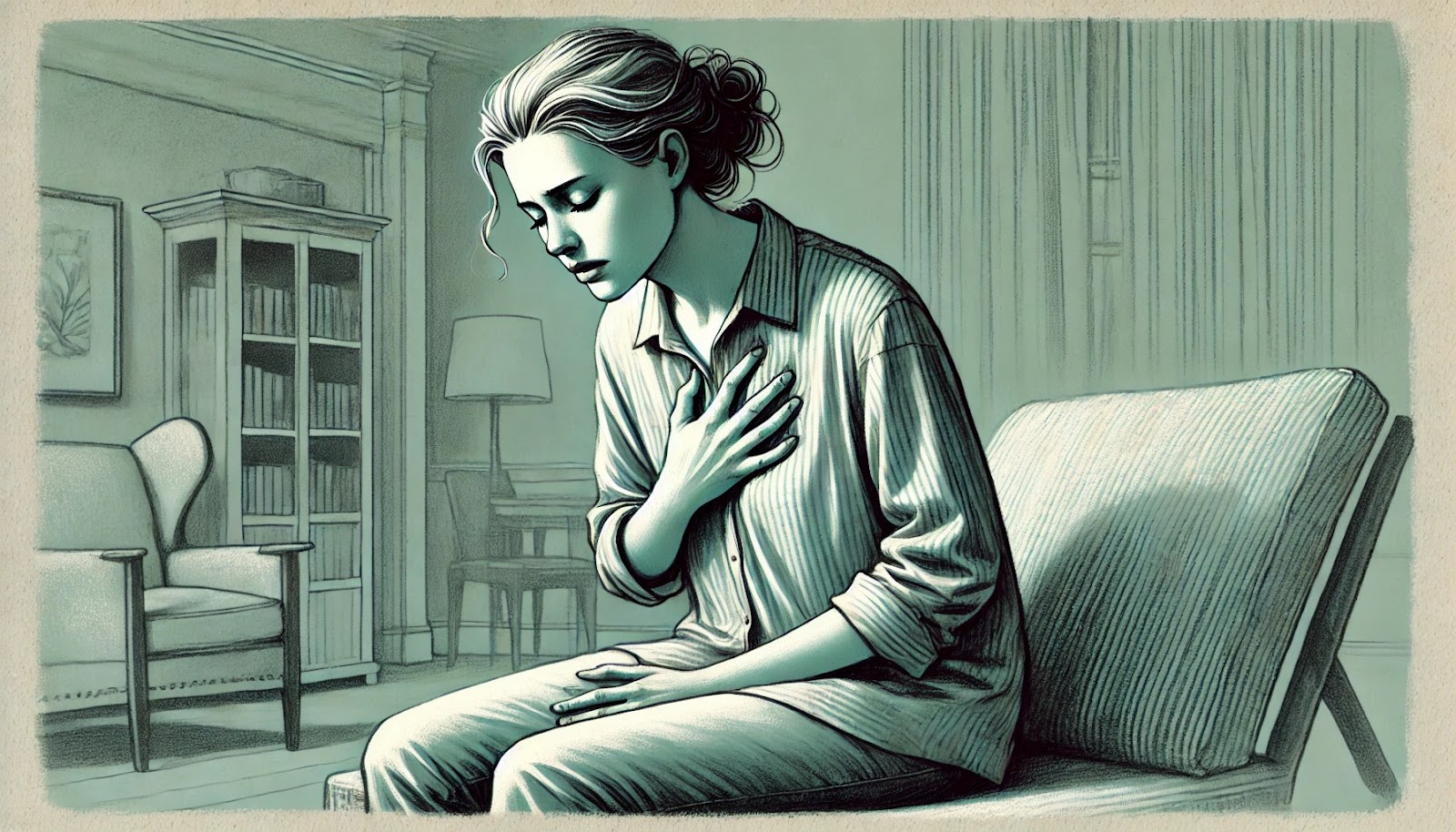
Key Takeaways
- Recognizing physical, emotional, and behavioral symptoms of anxiety can lead to early intervention and improved quality of life.
- Understanding and utilizing anxiety symptom checklists can help you manage anxiety more effectively.
- The Generalized Anxiety Disorder (GAD-7) checklist is a widely used tool that assesses common anxiety symptoms over the past two weeks.
- When using anxiety checklists, avoid common mistakes like downplaying mild symptoms, overlooking contextual factors like recent life changes, or relying solely on self-assessment without professional guidance.
- Mission Connection utilizes anxiety assessment with proven techniques like Cognitive Behavioral Therapy (CBT) specifically tailored to effectively combat anxiety disorders with personalized care plans.
Understanding Anxiety
Anxiety is more than feeling stressed or worried. While stress and anxiety share some physical symptoms, anxiety is characterized by persistent and excessive worry about a variety of things.
People with anxiety disorders often expect the worst and may be overly concerned about health, money, family, work, or other issues. These worries can be difficult to control and can interfere with daily life.
Causes of Anxiety
Some potential causes include:
- Genetics: Anxiety disorders can run in families, suggesting a genetic component.
- Brain Chemistry: Imbalances in certain neurotransmitters in the brain can lead to anxiety disorders.
- Environmental Stress: This includes stress from personal relationships, work, school, or financial issues.
- Medical Factors: Conditions such as heart disease, diabetes, and thyroid problems can exacerbate anxiety symptoms.
Mission Connection offers flexible outpatient care for adults needing more than weekly therapy. Our in-person and telehealth programs include individual, group, and experiential therapy, along with psychiatric care and medication management.
We treat anxiety, depression, trauma, and bipolar disorder using evidence-based approaches like CBT, DBT, mindfulness, and trauma-focused therapies. Designed to fit into daily life, our services provide consistent support without requiring residential care.
Symptoms of anxiety
Physical Symptoms

Common physical symptoms include:
- Increased heart rate
- Rapid breathing or shortness of breath
- Sweating and trembling
- Feeling weak or tired
- Gastrointestinal problems
- Chest pain
These symptoms occur because anxiety triggers the body’s fight-or-flight response, releasing adrenaline and other stress hormones that prepare the body to react to perceived threats
Emotional Symptoms
Emotionally, anxiety can cause:
- Feelings of apprehension or dread
- Persistent worry
- Feeling tense or jumpy
- Anticipating the worst
- Overwhelming emotions that interfere with daily life
These emotional symptoms can be particularly challenging as they often affect one’s ability to enjoy life and engage with others.
Behavioral Symptoms
Behavioral symptoms often manifest as changes in how one acts or interacts with others. They might include:
- Avoidance of situations that cause anxiety
- Restlessness or inability to sit still
- Difficulty concentrating
- Procrastination or indecisiveness
- Increased irritability.
Recognizing these symptoms can lead to early intervention.
Examples of Popular Anxiety Symptom Checklists
Generalized Anxiety Disorder (GAD-7)
The Generalized Anxiety Disorder (GAD-7) checklist is a self-administered tool that helps identify anxiety levels based on seven questions. Each question assesses how often you’ve been bothered by specific problems in the past two weeks, using a scale from “Not at all” to “Nearly every day.” It’s a quick and effective way to gauge the severity of your anxiety symptoms.
Beck Anxiety Inventory (BAI)
The Beck Anxiety Inventory (BAI) is another widely used tool, focusing primarily on the physical symptoms of anxiety. This checklist consists of 21 items, each describing a common symptom of anxiety. Respondents rate how much they’ve been bothered by each symptom over the past week. The BAI is particularly useful for distinguishing anxiety from depression, as it emphasizes somatic symptoms.
Hamilton Anxiety Rating Scale (HAM-A)
The Hamilton Anxiety Rating Scale (HAM-A) is a clinician-administered tool that evaluates the severity of anxiety symptoms. It consists of 14 items, each rated on a scale from 0 (not present) to 4 (severe). The HAM-A covers both psychic anxiety (mental agitation and psychological distress) and somatic anxiety (physical complaints related to anxiety). This scale is often used in clinical settings to assess treatment response.
Each of these tools can be instrumental in identifying anxiety symptoms. They provide a structured way to assess and track your anxiety over time.
Common mistakes in interpreting checklists
Misreading Mild vs. Severe Symptoms
One of the most frequent mistakes is misinterpreting the severity of symptoms. People might downplay mild symptoms, thinking they’re not worth addressing, or they might panic over severe symptoms, fearing the worst.
For example, someone with a score indicating mild anxiety might assume their feelings are not significant enough to seek help. However, even mild anxiety can impact one’s quality of life and, if left unaddressed, can worsen over time. Therefore, regardless of the severity indicated by the checklist, it’s advisable to take proactive steps in managing anxiety, through self-care strategies or professional support.
Overlooking Contextual Factors
Another common error is overlooking contextual factors that might influence anxiety levels. For instance, recent life changes such as a new job, moving to a new city, or personal loss can temporarily increase anxiety symptoms. These situational stressors should be considered when interpreting the checklist results.
Understanding the context in which anxiety occurs helps differentiate between temporary stress-induced anxiety and chronic anxiety disorders.
Ignoring Professional Guidance
While a checklist is a valuable self-assessment tool, it should not replace professional guidance. Relying solely on self-assessment can lead to misinterpretations and potentially inadequate responses to anxiety.

Importance of Identifying Anxiety Symptoms
Early Intervention Benefits
By addressing symptoms promptly, you can prevent the escalation of symptoms and the potential development of additional mental health issues. When you take action early, you set the foundation for a healthier, more balanced life.
Improved Quality of Life
When anxiety is managed effectively, you can enjoy better relationships, improved productivity, and a more positive outlook. You’ll find yourself more engaged in activities you love, and your overall sense of well-being will increase.
Also, managing anxiety can enhance your physical health. Reduced stress levels contribute to better sleep, lower blood pressure, and a stronger immune system.
Strategies for Managing Anxiety Symptoms
Mindfulness Techniques
Mindfulness techniques involve focusing your attention on the present moment, which can help reduce the constant worry and rumination often associated with anxiety. By practicing mindfulness, you can cultivate a greater sense of calm and clarity.

Therapeutic Interventions
Therapeutic interventions, such as Cognitive Behavioral Therapy (CBT), are highly effective in treating anxiety disorders. CBT focuses on identifying and challenging negative thought patterns that contribute to anxiety, replacing them with healthier, more constructive ways of thinking.
Another therapeutic approach is exposure therapy, which involves gradually exposing yourself to anxiety-provoking situations in a controlled and supportive environment. This technique helps desensitize you to these situations, reducing your anxiety response over time.
Lifestyle Modifications
Regular exercise, for example, releases endorphins, which are natural mood boosters. Aim for at least 30 minutes of moderate exercise most days of the week to reap the benefits.
A balanced diet also helps in managing anxiety. Consuming a variety of nutrient-rich foods can support brain health and improve mood stability. Limit caffeine and sugar intake, as these can exacerbate anxiety symptoms.
Adequate sleep is another essential component of anxiety management. Aim for 7-9 hours of quality sleep each night to help regulate your mood and reduce stress levels. Establishing a regular sleep routine can enhance your overall mental health.
Professional Support
A therapist or counselor can provide you with personalized guidance and strategies customized to your specific needs. They can also offer valuable insights and resources to help you manage anxiety.
Consider reaching out to a mental health professional if you’re struggling to manage anxiety on your own. They can assess your symptoms, provide a diagnosis if necessary, and work with you to develop a comprehensive treatment plan.
Taking the Next Step in Anxiety Management with Mission Connection

At Mission Connection, we don’t just help you identify anxiety, we help you overcome it. The convenience of our services and accessibility of our centers in California, Virginia, and Washington, means you can receive expert care when and where it suits you, eliminating barriers that often prevent people from seeking help.
Our multidisciplinary team of mental health professionals provides ongoing support throughout your journey, ensuring you’re never alone in managing your anxiety.
Remember, anxiety is highly treatable. Mission Connection is here to provide the safe, proven-to-work anxiety solutions you deserve. Begin your path to anxiety-free living today by connecting with our compassionate specialists for a personalized assessment.
Call Today 866-833-1822.
Frequently Asked Questions
What Is an Anxiety Symptom Checklist?
An anxiety symptom checklist is a tool designed to help individuals and healthcare providers identify and quantify anxiety symptoms. These checklists provide a structured way to assess the severity of anxiety and track changes over time. They often consist of a series of questions or statements that respondents rate based on their experiences.
Are Anxiety Checklists Accurate for Diagnosis?
While anxiety checklists are valuable tools for identifying symptoms, they are not diagnostic tools. They provide a preliminary assessment that can guide further evaluation by a healthcare provider. A comprehensive evaluation is necessary for an accurate diagnosis.
How Often Should I Review My Anxiety Symptoms?
Regularly reviewing your anxiety symptoms can help you track changes and assess the effectiveness of interventions. Consider completing a symptom checklist biweekly to monitor ongoing symptoms and identify patterns. By regularly reviewing your symptoms, you can make informed decisions about your mental health care and adjust your strategies as needed.
What treatment methods are used for anxiety at Mission Connection?
At Mission Connection, we use evidence-based approaches like CBT as well as other proven therapeutic techniques. Treatment is personalized to each individual’s needs and may include a combination of therapy approaches, mindfulness practices, and lifestyle recommendations.








